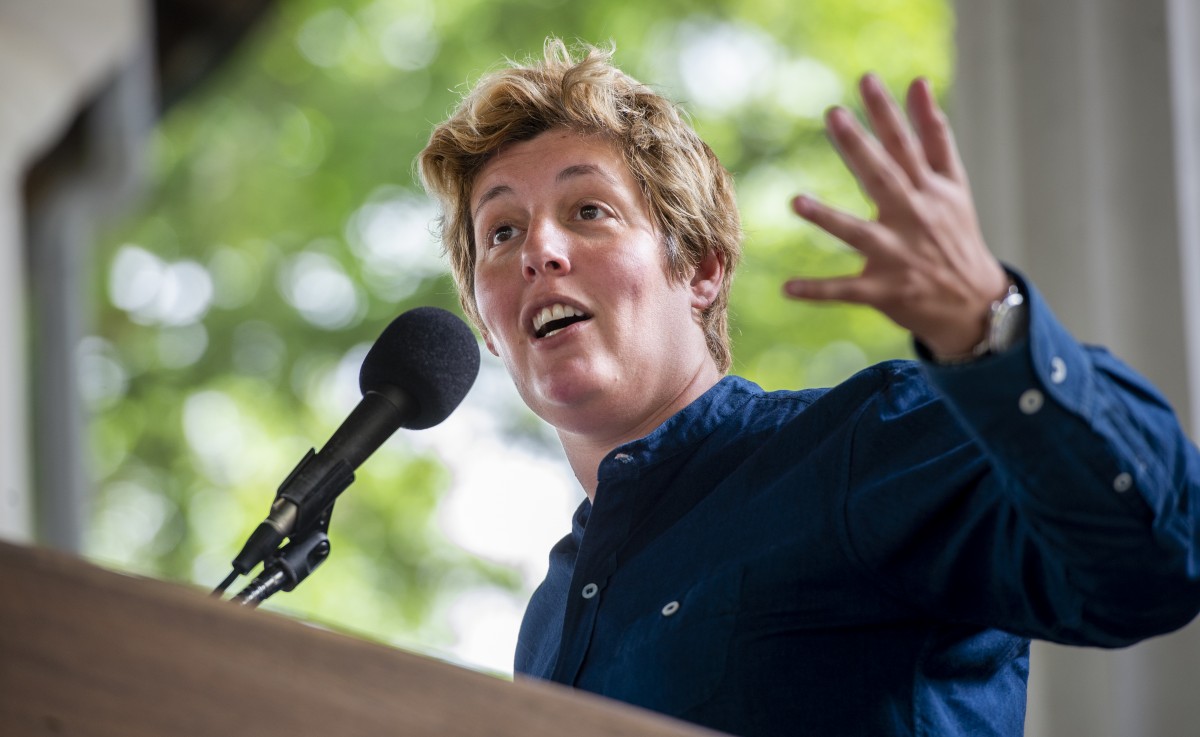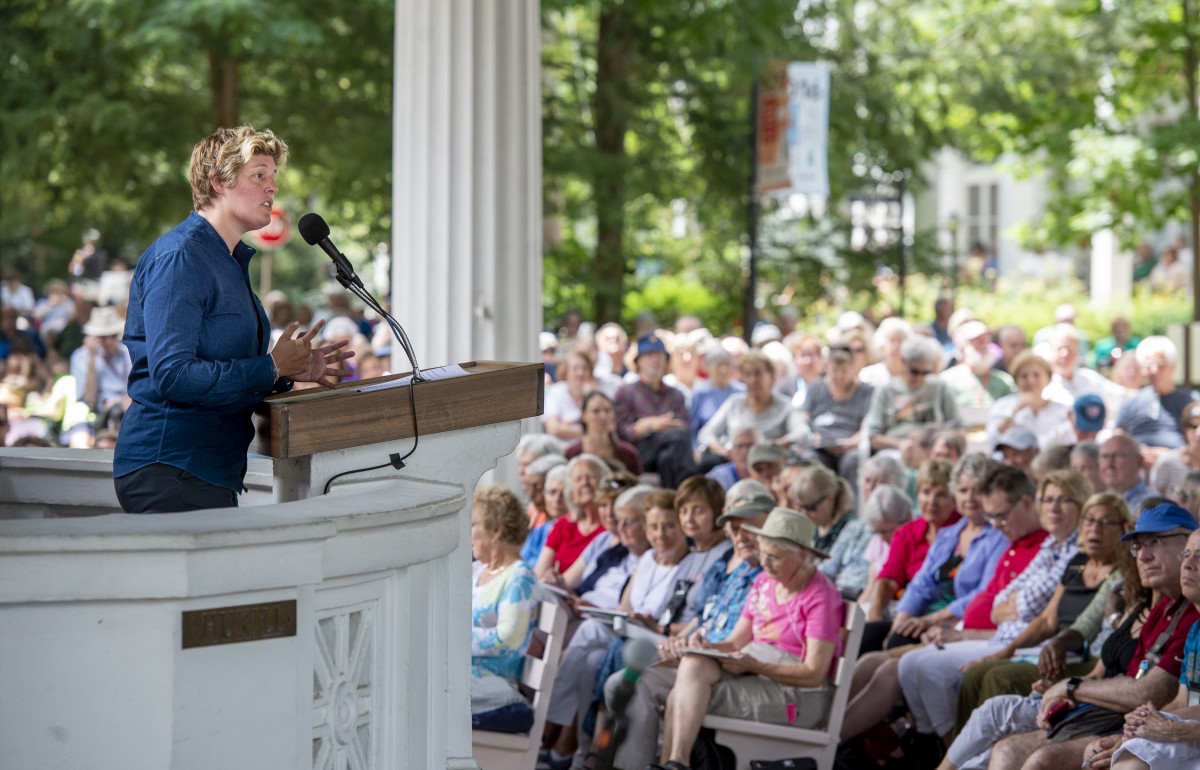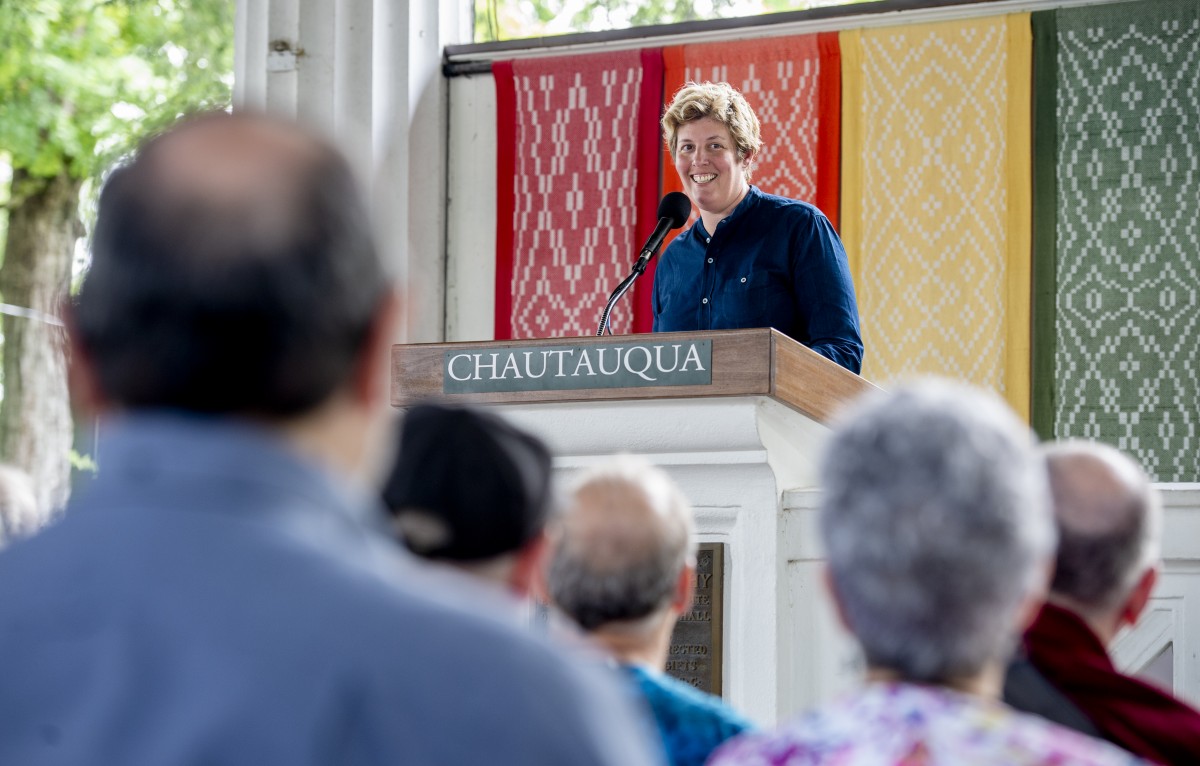The minute Sally Kohn’s 9-year-old daughter, Willa, was told ethics were the study of right and wrong, she knew there was no way it could be that simple. To Willa, even though people can be wrong for believing in something that is not morally right, she believes there is no such thing as wrong people.
And that, Kohn said, is where her daughter is exactly right.
At 2 p.m. Wednesday, July 25, in the Hall of Philosophy, Kohn, author, progressive activist and CNN political commentator, gave her lecture, “The Opposite of Hate,” as a part of the Week Five theme, “The Ethics of Dissent.”
“The question is, can we dissent from the bad things happening in the world without resorting to the idea that the people behind those bad things are permanently and irredeemably bad?” Kohn said.
Kohn said her politics come from a deep belief in equal dignity and justice for all people, along with the belief that if one shares those principles, dissent is not only necessary, it is the only ethical choice.
“In the face of extraordinary and mounting injustice, I think silence is immoral,” she said. “Dissent is not only just and justified, but required.”
Kohn began her career traveling as a senior campaign strategist with the Center for Community Change, helping communities band together to “make change in policies and institutions.”
One day, a producer saw Kohn speaking at a conference and told her she should be on television. She promptly dismissed the idea.
“The whole point of being an organizer is (that) you’re behind the scenes helping other people be in the spotlight — the people doing the work, the people affected by the issues,” she said.
In 2009, Kohn finally agreed to work with the TV producer to learn more about media in hopes it would make her a more well-rounded organizer. However, that decision progressed beyond her job as an organizer, and Kohn ended up spending two years as a progressive political commentator on Fox News.
“This is the part I should probably mention: I’m gay,” she said. “As you might expect, a lefty lesbian community organizer on Fox News is kind of a strange thing.”
Kohn said the first day she walked into Fox News, she was “prepared for battle.”
“I was up in arms,” Kohn said. “Not just politically, but emotionally.”
Kohn believed the people she had watched on air and the viewers who supported the ideological beliefs of the network would be “completely and totally hateful people in every sense.”
But two things happened on her first day. One, Kohn realized the Fox News employees were merely people. Two, she realized where the hate she feared receiving actually stemmed from.
“I am the one who hates them,” Kohn said. “I was the one who had all of these stereotypes and preconceived notions. I made these blanket generalizations and judgments about people, whole groups of people I had never even met.”
Kohn’s revelations at Fox are what led her to investigate hate in society, which she did in her most recent book, The Opposite of Hate: A Field Guide to Repairing Our Humanity.
“I wanted to look at the science and psychology of why we hate and why we demean and dehumanize people and groups of people because of their ideas and their identity,” she said.
In addition to examining why people hate, Kohn also compiled a series of stories about people like former terrorists and neo-Nazis who left “lives of extraordinary hate behind.”
“I figured, if they can do it, there’s got to be hope for me and the rest of us,” she said.
Kohn said her journey gathering information for The Opposite of Hate reaffirmed her core values, something she thinks is difficult to do in America.
“In moments of struggle, especially in the sort of ethic, political struggles our country is facing now, it can be easy to lose sight of our values,” Kohn said. “Or worse, to let our opponents shape our values for us.”
Just as Kohn believes there is right and wrong in the world, she also thinks there is a right and wrong way to dissent.
“When we seek to protect the equal dignity and treatment of some by attacking and demeaning others, we violate the principles we purport to defend,” she said.
To Kohn, it is unconscionable that certain world leaders, and by extension their followers, treat entire groups of people “like disposable trash.”
However, the problem to Kohn is that people direct their anger not only at the opposing side’s beliefs, but at the people behind the beliefs “in broad and totalistic ways.”
“We are fighting the incredibly unjust and offensive generalizations on Muslims, for instance, based on the heinous acts of a small handful of extremists, and in turn making generalizations about all conservatives, all people from the South or even all Trump voters,” she said.
Kohn recognized that while some people may believe it is a “blind rationality” to dismiss President Donald Trump’s supporters, it is still wrong to assume those supporters believe everything he stands for. However, Kohn said instead of questioning the morality of Trump voters, it is more important to believe that they can change before the next election.
“To me, ethical dissent means we stand up for the equal dignity and humanity of those on our side while not rejecting the dignity and humanity of those opposing us,” she said. “This is only possible if we believe that all people are inherently good and full of the intention of goodness.”
To contextualize her argument that anyone can be good, Kohn explained why she opposes the death penalty.
“I believe no person should be condemned to death, that no person should be judged for the worst thing they have ever done in life,” Kohn said. “People are inherently possible of change and redemption and deserving of forgiveness. Can I have that same grace for Trump supporters?”
Kohn said Trump followers deserve grace because it is “important to separate leaders from followers.”
“We blame the people themselves and blame their angry (reactions), not as a condition created by leadership and context, but as inherent to them,” she said. “Isn’t it wrong, not to mention inaccurate, to portray people who are following the context set out by leaders and media as inherently wrong?”
Kohn believes being angry toward people for falling prey to hateful views and feeding into them is valid, but it does not justify hatred in response.
“Hatred is never the answer to hate,” she said. “Just like cruelty is never the answer to cruelty, and injustice is never the solution to injustice. We should hate problems, not people. We should fight ideas, not individuals. Dissent should not be personal, it should be principle.”
On the other hand, Kohn said it is natural to believe it is naive to respond with compassion and kindness in the face of injustice.
“I understand the impulse — suggesting that to be kind in the face of cruelty is not only naive, but tying one hand behind our back in the fight for our lives,” Kohn said. “At moments, I want to come out with both hands swinging.”
However, in studies of of revolutionary movements and movements of dissent for justice around the world, nonviolent movements have always been more successful, she said. Therefore, Kohn will continue to practice what she preaches by teaching her daughter that violence is never justified, people are inherently good and change is always possible.
“While I still believe there is right and wrong, and I still try to teach (Willa) there is right and wrong, she is right that there are no wrong people,” she said. “When I keep that principle as the north star in my dissent, then I really am creating a possibility for change and, I believe, doing what’s right.”







